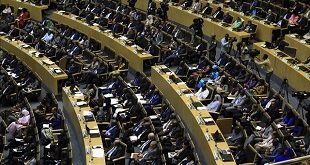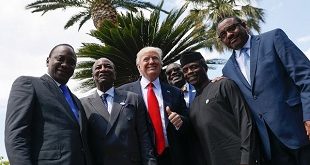
By Kalundi Serumaga
There are times when a moment of silence can seem louder than actual noise. The current silence of those who were previously the vigorous advocates of imposing the Western neo-liberal economic doctrines of ‘donate, privatise and sell’ on Uganda, is one such moment.
What little commentary they have managed to make sounds like the ‘confused noise made by the ram after the butcher’s knife has sunk past the windpipe’ to borrow a quote from Uganda’s most famous poet, Okot p’Bitek.
At one public dialogue on the crisis held on November 28, 2008 Dr Emmanuel Mutebile (Governor, Bank of Uganda) declared: ‘I repeat that the immediate impact of the financial turmoil in the western world is almost zero with the single exception of the impact of the exchange rate…’. Dr Abebe Selassie (Country Representative, International Monetary Fund) said: ‘what we are seeing is a sharp slow down in economic activity globally and in Uganda’s trading partners’; and Professor Paul Wandee (World Bank), was wonderfully vague with: ‘the global crisis effects could have multiple effects on Africa as private investment will be under heavy pressure’, when discussing the situation.

So, no answers there, then. Instead, all three high powered and well-informed gentlemen seemed capable only of speculating about the possible effects (or lack of them) of what is going on, rather than telling us why it is happening.
After twenty years of very vocal advocacy, the silence over the fundamental issue is paradoxically understandable and inexcusable all at once.
It is understandable, in the face of the wholesale collapse of the economic model in the hands of its real owners in the industrial countries starting in mid-2007, resulting in them abandoning each one of the arguments used and followed by their African followers to justify the selling off of the post-independence economy. After all, if the owners of the doctrine have abandoned it without explanation, how are the mere third world messengers expected to explain it?
We were told that the private sector was the best possible engine of economic growth, and that therefore regulation on market activities should be reduced if not removed altogether. We were further told that direct state engagement in the market was a bad thing as ‘government had no business trying to do business’ as state-owned enterprises were inherently ineffecient, and too prone to manipulation by powerful political interests. We were also told that the market is the best arbiter of who is to survive in the economy; the inefficient must be allowed to fail and the fittest thrive, for the greater good of the whole economy. Accordingly, laws were passed to enable the selling off of a whole host of struggling or insolvent public enterprises to private investors (in some cases, they were declared worthless, and just given away). There was even a deregulation unit set up to allow investors a quicker, more direct entry into the economy.
The silence is inexcusable in the sense that somebody ought to at least have the courage to account for the 20 years of misery that have been imposed on the people here, as well as the further economic insecurity that is yet to come, as a result of this bitter economic medicine.
The Uganda People’s Congress party summed up the dire situation best in an early October statement on the unfolding crisis in the west: ‘With the liberalization of the Uganda economy, which effectively meant privitisation of state enterprises, retrenchment of public servants leading to massive unemployment and out sourcing of work ordinarily done cheaply by public servants, Uganda joined the free world of smart investors or speculators. The people who have amassed wealth ………. are not the producers of real wealth but the smart dealers and the corrupt who supply to government and its agencies at exaggerated prices and then speculate in real estate driving prices of land ….to levels beyond the reach of the working people….’
And they should know, being the ones with the whole 1960’s policies of a highly centralised state made the elite of whole country focus on Kampala City as the only place to live and invest.
Yet we have now witnessed the sight of leaders of the world’s biggest and most ‘successful’ economies go begging for state intervention from their governments and international bodies like the International Monetary Fund. In addition, they have been demanding that the state even take over some of these enterprises (as has happened in several cases in the US and the UK).
We need to understand how the same situation produces diametrically opposite solutions -from the same mouth- depending on whether it is happening in Africa or in the West. At the insistence of western economic experts, our state enterprises were sold off because they were inefficient and/or insolvent. Now, their enterprises in their economy are being nationalised precisely because they are insolvent! Somebody has been fooled here, and I think it’s us.
The reality is that capitalism has always been a rogue economic system that can only generate wealth at the expense of rampant destruction of communities and their environment. From its roots, capitalism was always built on the seizing of public wealth for private gain. The factory, capitalism’s original unit of production, functions by paying labourers a mere fraction of the wealth of the goods their labour has produced, and keeping the balance as a ‘profit’. The UK industrial revolution occasioned the wholesale seizure and privatisation of communal lands in the north of England, Scotland and Ireland, and the mass eviction of the clans and communities that lived there
The second and last part of this article will be published in the next issue.
 The Independent Uganda: You get the Truth we Pay the Price
The Independent Uganda: You get the Truth we Pay the Price


